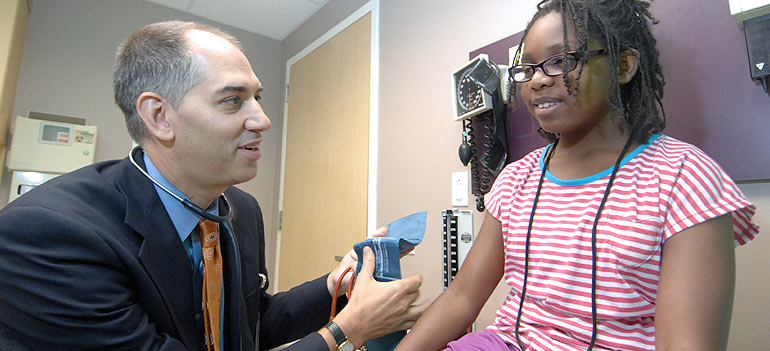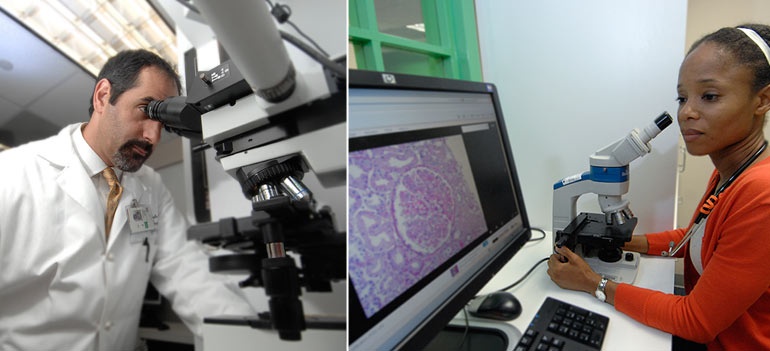Curriculum Overview
During the 36-month training period, each fellow spends 12 months on inpatient clinical service. The remaining months of fellowship are reserved for scholarly activity and electives (Pediatric Urology, Renal Pathology, and Renal Radiology). Throughout training, fellows spend 1 afternoon each week in a continuity outpatient clinic and an additional afternoon in a rotating sub-specialty clinic such as transplant or hypertension. Though each fellow’s schedule is individualized, basic information on First Year, Second Year, and Third Year of the program is provided below.
First Year
 The first year serves to create a solid clinical base in pediatric nephrology. This year is also used to begin basic coursework in the Clinical Research Curriculum and work with a mentor to narrow the scope of scholarly interests. While on the three to four-month nephrology service, fellows receive hands-on training in managing patients admitted to the nephrology service at Children’s Memorial Hermann Hospital. In addition, trainees gain expertise in providing consultation to other services, including the PICU, NICU, general pediatrics, and all other teams. Our division also provides consultation services to the University of Texas MD Anderson Cancer Center, the Women’s Hospital of Texas, and LBJ Hospital (the Harris County Hospital for indigent patients). Fellows learn to manage many disorders, including acute kidney injury and chronic kidney disease, hypertension, fluid and electrolyte imbalances, acid-base disorders, new and relapsing nephrotic syndrome, acute and chronic glomerulonephritis, hemolytic-uremic syndrome, new and established renal transplant recipients, as well as both peritoneal and hemodialysis patients. Our fellows learn to manage all acute dialytic modalities, hemodialysis, peritoneal dialysis, and continuous renal replacement in the form of both CRRT and SLED.
The first year serves to create a solid clinical base in pediatric nephrology. This year is also used to begin basic coursework in the Clinical Research Curriculum and work with a mentor to narrow the scope of scholarly interests. While on the three to four-month nephrology service, fellows receive hands-on training in managing patients admitted to the nephrology service at Children’s Memorial Hermann Hospital. In addition, trainees gain expertise in providing consultation to other services, including the PICU, NICU, general pediatrics, and all other teams. Our division also provides consultation services to the University of Texas MD Anderson Cancer Center, the Women’s Hospital of Texas, and LBJ Hospital (the Harris County Hospital for indigent patients). Fellows learn to manage many disorders, including acute kidney injury and chronic kidney disease, hypertension, fluid and electrolyte imbalances, acid-base disorders, new and relapsing nephrotic syndrome, acute and chronic glomerulonephritis, hemolytic-uremic syndrome, new and established renal transplant recipients, as well as both peritoneal and hemodialysis patients. Our fellows learn to manage all acute dialytic modalities, hemodialysis, peritoneal dialysis, and continuous renal replacement in the form of both CRRT and SLED.
Though not always completed in the first year, two months of fellowship are devoted to the outpatient Pediatric Dialysis Unit. The fellow works with dialysis nurses and McGovern Medical School faculty to learn the technical aspects of dialysis procedures, vascular access, how to set up and troubleshoot dialysis machines, and understand some of the duties of the dialysis Medical Director.
During the first year, fellows also identify their chosen research track: basic or clinical scientist. They select members of the Scientific Oversight Committee (SOC) and begin the early phases of their research project.
Second Year
The second year of fellowship is devoted more to pursuit of scholarly activity. Fellows ideally complete the clinical research training provided in the Clinical Research Curriculum and may opt to begin advanced coursework by pursuing a Master’s in Clinical Research through the Institute for Clinical Research and Learning Health Care. They will start work on their research project under the guidance of their mentors and SOC. Clinical responsibilities will include outpatient clinics two days a week, three to four months of inpatient nephrology service, and monthly weekend coverage.
Third Year
The fellow will complete their research projects and write the related abstracts and manuscripts. In addition to their main scholarly project, many fellows often use this time to publish case reports, present posters at national scientific meetings, coauthor book chapters, and review articles. Fellows complete the rest of their required service time, with the final inpatient month spent as “acting attending,” in which they will supervise residents in a capacity similar to an attending, with ongoing support from the nephrology attending.
Conference Opportunities
Thanks to a generous academic endowment, fellows have the opportunity to participate in national and international pediatric nephrology conferences each year. Travel funding is available for both core meetings and additional conferences aligned with each fellow’s research interests and career goals.
Key Conferences Include:
- Annual Miami Pediatric Nephrology Spring Meeting
- American Society of Nephrology (ASN) Kidney Week – Houston 2025; Denver 2026
- National Kidney Foundation Spring Clinical Meetings – Boston 2025; New Orleans 2026
- Renal Healthcare Association Annual Conference – Orlando 2025
- International Pediatric Nephrology Association (IPNA) Congress – Kyoto, Japan 2027
- Pediatric Academic Societies (PAS) Meeting – Hawaii 2025; Boston 2026
- Additional Opportunities – Fellows may also attend other conferences that support their research and academic interests
